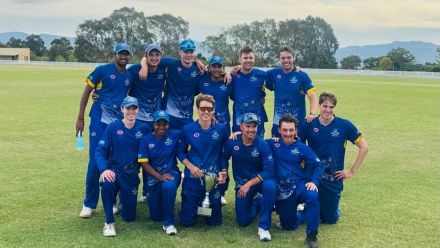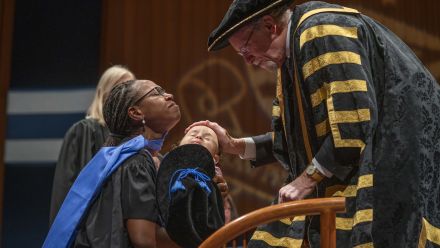Endowment allows researchers to get on with their work
Without the money we would have stalled at the stage of having a very important repository of samples without being able to look at them
In the early 1980's, ANU Alumnus Alan Harvey was diagnosed with Common Variable Immune Deficiency (CVID). CVID is a rare disease that leaves your body defenceless against infections due to an inability to develop and mature cells in the immune system. After 10 years of successful treatment Harvey was diagnosed with Crohn's disease. Unfortunately, this resulted in a steady physical decline, which culminated in his passing in 2009. As a memorial to Alan's courage, strength, perseverance and achievement, his family, friends and colleagues established the Alan Harvey CVID Research Endowment. The Endowment was established to support research into CVID, to better understand the disease and to develop prevention techniques and treatments. Now three years later I look back at what this support has achieved and what the future holds for CVID research at ANU.
In a busy café nestled in the state-of-the-art John Curtin School of Medical Research building I sit with Dr Matthew Cook, one of the chief researchers working on the CVID research project. Splitting his time between The Canberra Hospital, where he is the Director of Immunology and Translational Research, and his research at ANU, Matthew is keen to get started explaining that this project "is one of the most exciting things I've done for a while." CVID is a rare disease - in the world of medical research that means it doesn't get a lot of attention. But this doesn't matter to Matthew who says, "if you are a patient it doesn't make a difference if you have a rare disease or a common disease - either way you want it solved. If we can find a solution it will make such a huge difference to patients' lives." In addition, the research will contribute to scientists' understanding of immunity in general. Findings from this research could help researchers' who are looking into other immune-mediated diseases, including Lupus, Type 1 Diabetes and Rheumatoid Arthritis.
Getting down to the basics of the disease, Matthew explains that "CVID is a failure of antibody production so your body can't mount an appropriate defence against infections. The main manifestation of the disease is recurrent infections." These infections usually occur in the ears, sinuses, nose and lungs. Although people who don't have CVID can also suffer from these infections, the difference in people with CVID is that the infections are unusually recurrent, prolonged, severe or resistant to normal treatment. To combat the effects of the disease patients can undergo regular Plasma Replacement Therapy, the replacement of a patient's plasma (the liquid in which blood cells are suspended in the body) with plasma from a donor, which restores antibody levels and protects from infections. Matthew says "if caught early, Plasma Replacement Therapy is often very effective and can give a patient the ability to live a relatively normal life. However, because it's a rare condition there is often a long lead time between the first manifestation and diagnosis." As a result, sufferers can have recurrent infections like pneumonia which can leave permanent lung damage often leading to premature death.
While the ideal result of the research would be to find a more specific way to treat CVID, the first step is to establish better ways of diagnosing patients so that early detection (or hopefully detection before the first onset of symptoms) can take place - the solution to which is believed to lie in the genes.
"Our approach to this research is very much based on the assumption that there is a genetic component to the disease," Matthew explains. The overall strategy is to identify the genetic basis behind the disease so that diagnosis can be made and so that the cellular mechanisms that cause the disease can be looked at to help identify other treatments. To do all this requires the team of seven to conduct exome sequencing, in which the detailed genetic code for all of the proteins in the body is read out. These exome sequences are then looked at to see if mutations, that could be causing the disease to occur, can be identified in the genes.
In its early stages the project attracted some grants from The Australasian Society of Clinical Immunology and Allergy and The Canberra Hospital. This money helped the team gain ethics approval for the project and put infrastructure in place for collecting and storing samples of patients' blood. The project now has funding from the National Health and Medical Research Council as well. The Endowment, established in Alan's name, was set up shortly after the project had finished collecting samples. Matthew explained "the money donated to the Endowment meant we could actually get started on the experiments, allowing us for the first time to start to see what was going on in the genes of these patients. Without the money we would have stalled at the stage of having a very important repository of samples without being able to look at them."
Despite the research being in an early stage, they are already starting to see patterns in the exome sequences they have completed. "We have some very strong leads which we are at various stages of proving," Matthew advises. He explains that "CVID is a very heterogeneous disease which means that very few people will have the same combinations of mutations in their genes. What we don't know is what proportion of CVID cases will be down to one gene going wrong or a handful." While there are still a lot more questions than answers his team thinks, from what they have seen so far, that there will be a significant proportion of sufferers with one or maybe two genes that are having very strong effects.
"So what's next?" I asked eagerly, not appreciating the careful pace these projects take. Matthew answers, "we are still recruiting more patients to give samples of their blood. Potentially we will sequence the exomes of every CVID sufferer in Australia, but at the moment we still have a long way to go to reach this goal." Matthew goes on to explain that there is so much more to be done but one of the barriers to faster progress is support for people in the lab who perform the research. Deciphering each exome is an enormous task - thankfully the Alan Harvey CVID Research Endowment will continue to help support Matthew and the researchers that come after him.


